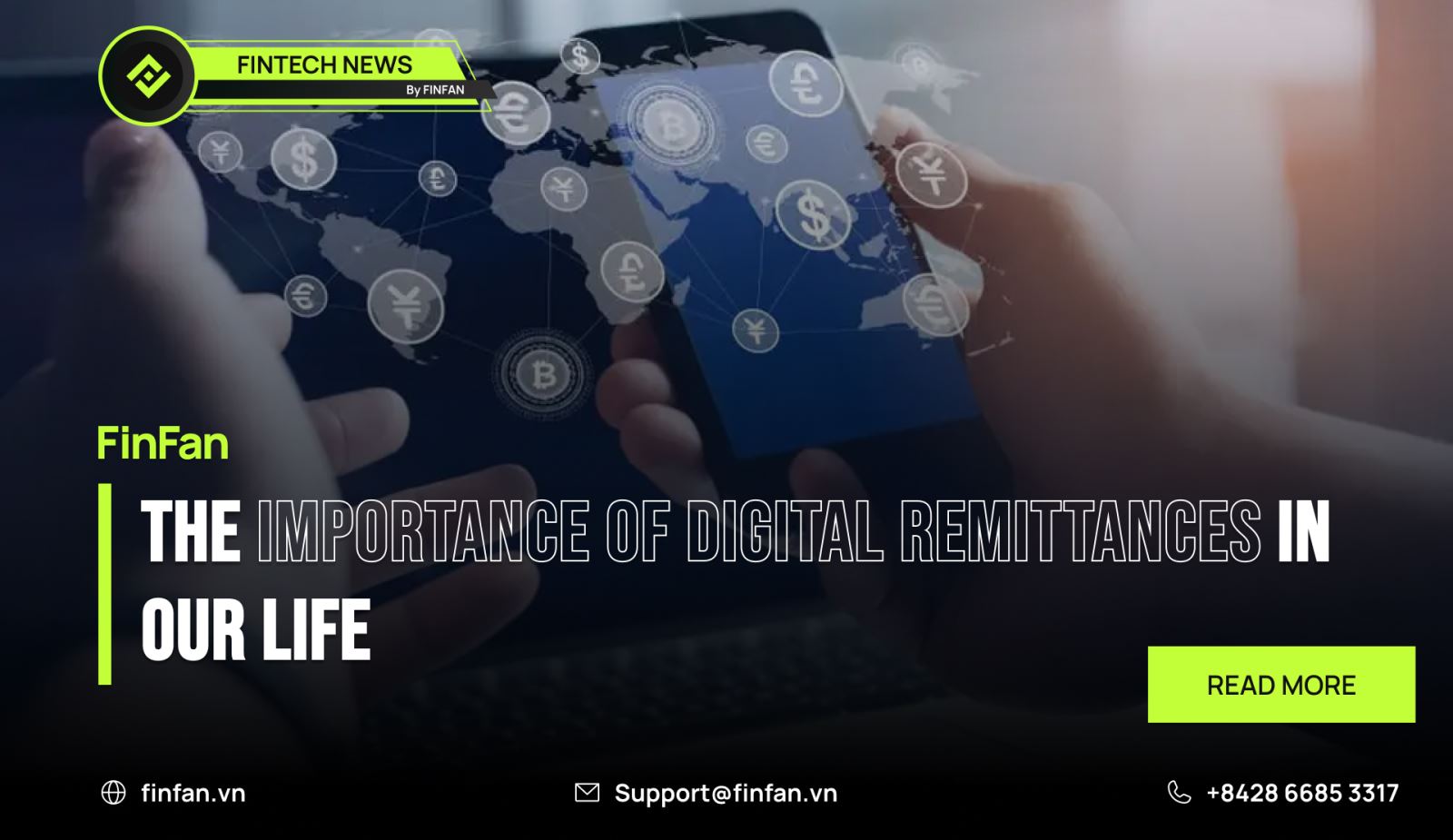The importance of digital remittances in our life

Remittance is an indispensable part of money that contributes to the growth of a country's economy. According to the latest statistics, the number of remittances sent to Vietnam has reached more than 9 billion dollars and accounts for 3 times the total FDI capital flowing into Vietnam in the past year.
That is an important example to demonstrate the influence of remittances on a country's economy. Next, let's join FinFan to learn about the importance of digitizing remittances for a country.
Remittances and the strengths it brings to people in Vietnam
Remittances play a very important role in many countries around the world. Especially developing countries. For Vietnam, remittances are becoming increasingly important.
In recent years, the flow of remittances into Vietnam has continuously increased in both absolute numbers and relative numbers compared to GDP, contributing to compensating for the trade balance deficit, eliminating hunger and reducing poverty, and improving the living standards of Vietnamese people. A part of the population receives remittances.
Currently, in addition to remittances, there are also other forms of money transfers from abroad to Vietnam. However, compared to foreign direct investment (FDI) or aid, remittances are a stable source of foreign currency. Even in times of economic crisis, it plays a very important role in the economy.
+ Offset the trade balance deficit, eliminate hunger, reduce poverty, and improve the living standards of a part of people receiving remittances.
+ Create more resources for the land economy, reduce imbalances in the balance of payments, improve foreign exchange reserves, reduce pressure on exchange rate increases...
+ Balance the current account, increase national foreign exchange reserves, reduce dependence on foreign capital as well as exchange rate pressure on the US dollar.
+ Create more jobs and stabilize people's lives through investment and business of overseas Vietnamese, while contributing to improving budgets for housing, health care, and education.
Digital remittance can help to reduce costs and time.
*Across the globe, nearly one billion people rely on sending remittances to family or friends in other countries. However, remittance costs have risen to unnecessary highs. In Q4 2022, the average cost of sending $200 was 6.2 percent – more than double the UN’s target (three percent or under) for reducing all remittance costs.*
*Source: The Fintech Times
For that reason, some expatriates abroad who want to send money from abroad to the country where they were born and raised are not willing to transfer money back (even though they are in countries on the same continent, especially with countries in the African region).
Furthermore, transferring money internationally to the country they live in also takes a lot of time (it can last up to 1 week and is not safe).
However, today, as digital remittance technology becomes more and more advanced, the above problems can be completely solved at almost zero fee and the amount can be transferred directly to the account of receivers as quickly as possible.
Even today, you can transfer money directly from international banks to the recipient's e-wallet like the combination of FinFan and Ria Money Transfer as well as Sendwave.
Digital remittance needs to help with adoption challenges.
Despite bringing many benefits for faster, more economical, and safer money transfers, the application of digital remittances to businesses still faces many complicated legal procedures in several regions of the world and right in Vietnam.
Remittances are money transferred by people residing or working abroad (overseas residents) to relatives in Vietnam. Nowadays, remittances are understood more broadly, including gold. (Decision No. 270-CT dated October 20, 1988, of the Chairman of the Council of Ministers on "Receiving and paying remittances in gold").
In 1957, one of the earliest documents mentioning remittances was issued. (Circular No. 145-TTg dated April 9, 1957, of the Prime Minister on "Developing and implementing foreign exchange plans).
In 1970, the law stipulated a policy to encourage overseas Vietnamese to transfer foreign currency and gold back home. (Decision No. 155-CP dated August 21, 1970, of the Government Council on "Policy to encourage Vietnam to transfer capital and gold to the country".
In 1980, the law stipulated: "Gold, precious metals, and gemstones are purchased by the State at incentive prices equal to the State's directed price plus an incentive rate announced by the State Bank." (Article 2 of Decision No. 32-CP dated January 31, 1980, of the Government Council on "Policy to encourage the transfer of foreign currency into Vietnam).
Grasping this trend and regulation, FinFan, one of the leading enterprises in the remittance industry in Vietnam, licensed to receive international foreign currency payments in 2014, has been implementing many new products and services to support users. Use international money transfers directly to Vietnamese users' bank accounts or e-wallets.
Moreover, FinFan already integrated with almost the world's well-known MTOs, PSPs, switch and core fintech platforms as Money Gram, Thunes, Qiwi, Remitly, World Remit, Bancore, PaySend, Terrapay, Ria Financial (Euronet), Dlocal, Ripple, TripleA, FoMo Pay, Wings, ... or MoMo, Zalo, VNPay, VNPT, ...etc. For more information, visit: https://finfan.io/
In short, urgently deploying products and services related to digital remittance is urgent and very important. Although there are still some problems in terms of legal procedures, recent statistics have allowed us to see encouraging signs to continue to believe in the positive things that this industry brings to countries.
Some important statistics:
- Increasing migration flows, advances in technology, and the globalization of trade are some of the factors contributing to the sustained growth of remittances and they show no signs of slowing down; the value of cross-border payments is expected to grow to $ 250 trillion by 2027.
- Globally, we’ve witnessed a surge in cross-border remittances – funds sent by a migrant to their home country across national borders – with a 13 per cent increase since 2022.